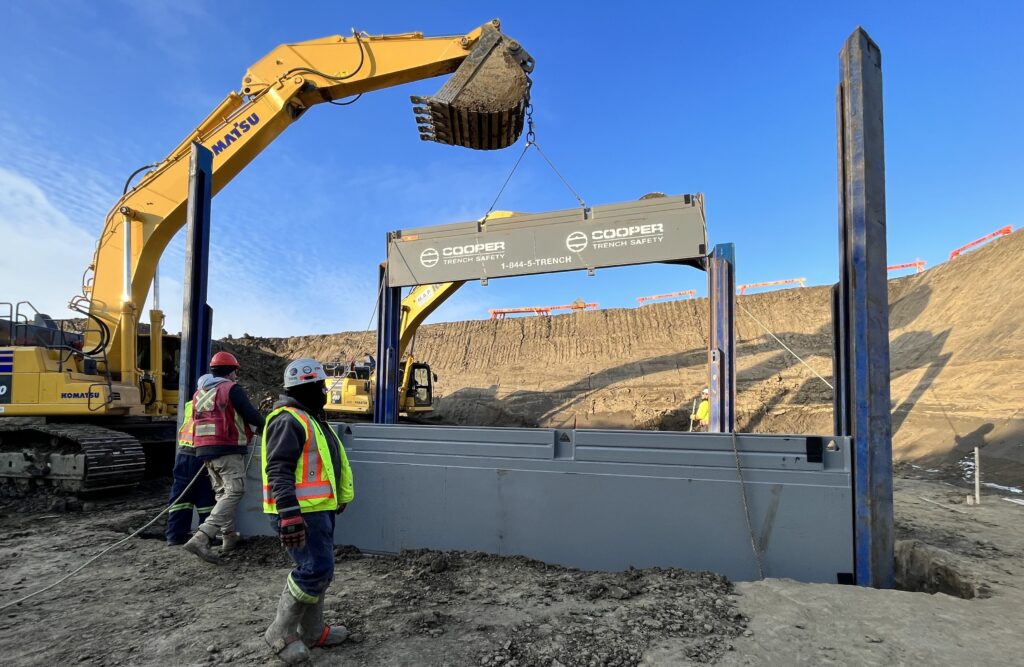
The right trench excavation equipment is just one way to minimize the chance of accidents on the jobsite.
Working in and around trenches is a regular part of many construction and utility projects. Yet a lot of accidents still happen. Trench excavation is a dangerous job if the right precautions aren’t taken. Non-compliance is the biggest threat to trench safety. Some contractors choose to operate outside the safety system to save a bit of cash, and their workers may feel like they can’t speak up for a number of reasons. The results can be fatal. In 2023, a Calgary worker lost his life when his supervisors failed to provide trench safety equipment.
We never want to hear news like this. Trench Safety Stand-Down week is a great opportunity for employers to talk directly to their workers about safety issues and concerns. When employees feel safe to speak up, we can start to prevent these types of incidents in the future.
The good news is…by engaging your rental partner, you can access the right trench safety equipment and training to meet your unique jobsite demands. Let’s jump into some trench safety advice you can practice on your jobsite today.
- Know your jobsite
Excavations can be dangerous and sometimes even fatal. That’s why it’s important to practice proper shoring/sloping practices to improve worksite safety. A common mistake we see on sites is improperly sloped excavations. The angle of slope required depends on the soil conditions. Type A soil, which is silty and sandy, performs very differently from type C soil, which is more granular. A soil assessment is a crucial first step. Conditions can change quickly so make sure to engage a qualified expert to help determine your soil type.
When it comes to trenching excavation you also want to be aware of any existing utilities and structures. This will also determine the type of trenching or shoring equipment you will need and help prevent damage. Always ensure there are no underground utilities in proposed excavation areas or have utilities properly marked prior to digging.
- Follow regulations in your region
Trench safety is regulated by the OHS, but specific requirements vary from region to region. Before you start any trenching excavation, be aware of the legislative requirements that apply in your jurisdiction and the type of protective measures you’re required to take. What’s okay in one province may get you a heavy fine in another.
In general, trenches that are 1.2 metres (4 feet) deep or greater require a protective system unless the excavation is made entirely in stable rock. There are a few factors to consider including soil type, depth of cut and weather conditions. Remember: trenches that don’t meet these requirements are unsafe for workers. And even when requirements are met, they should never work in a trench alone.
- Rent your equipment from a reputable partner
Trench excavation equipment is a cost-effective solution for any contractor. And it certainly costs less than a lawsuit…plus, if it means saving someone’s life, it’s a no-brainer.
Work with a reputable rental partner who can provide you with the right equipment, but also the right expertise, solutions and a team that knows and understands your business and jobsite. Sourcing your equipment from one provider (like a one-stop-shop for all your project needs) means you can reduce costs, increase productivity and better protect your workers.
- Make sure your workers are trained
Your rental provider can and should support you with training. A better understanding of when you need trench safety and when you don’t will benefit your business. A basic understanding of legislation can also help you understand the types of products available for rent and how to use them properly.
At Cooper, we train our customers on everything from product assembly to best practices straight from the manufacturer. We can also recommend how to adapt your existing safety programs to meet regulations while ensuring the proper steps, processes and procedures are followed when it comes to trench excavation equipment.
- Don’t be afraid to ask for advice
There are people out there with a lot of knowledge and experience in trench safety. If you don’t know the answers, engage an expert to understand the situation and the application so you don’t put your workers at risk. There are no excuses for excavation fatalities when a trench box is on site but not being used properly.
If you want to avoid trench excavation accidents, your rental partner can provide the best solutions for your project. A little planning goes a long way when it comes to trench safety so don’t forget to engage them from the beginning of the job for the best outcome.
To find out more, contact our Trench Safety team today.
0 Comments